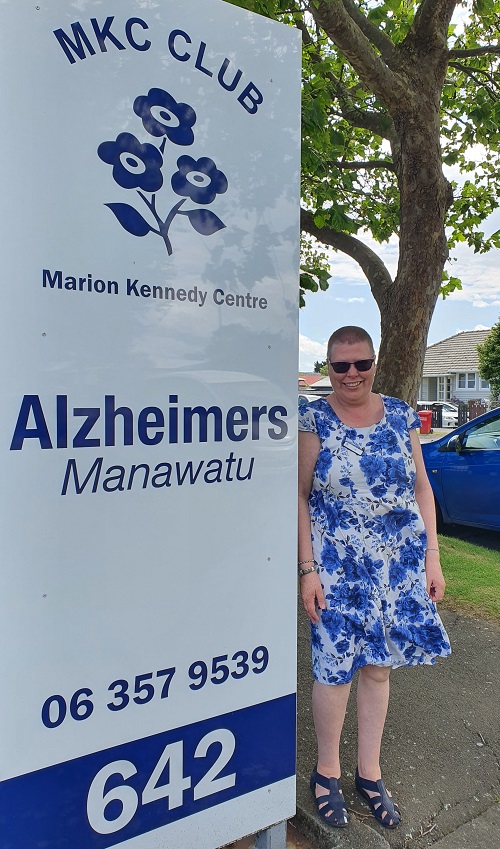Support worker Joanne Hood is overcoming the challenges of dyslexia to succeed as a diversional therapist and bring joy to people’s lives.
Joanne lives with Irlen Syndrome, a particular type of dyslexia, where the brain is unable to properly process visual information, because of sensitivity to certain wavelengths of light.
She quit school early after being told by some of her teachers that she was dumb and would never get anywhere. Her dyslexia was not picked up until much later.

Diversional Therapy apprentice, Joanne Hood
Joanne now helps to run day centre programmes for people affected by dementia across the Manawatu, Horowhenua and Tararua regions. The day centres provide Cognitive Stimulation Therapy, an intervention to improve the quality of life for people with dementia. Although Joanne is a confident and articulate communicator, she struggles with reading and writing. Having Irlen Syndrome means that she sees distortions on the printed page. The glare hurts her eyes, gives her headaches, and makes reading and writing difficult and tiring.
“It’s just a very rewarding job. I love bringing joy into their lives.”
With support from her employer Alzheimers Manawatu, and work-based training provider Careerforce, Joanne is completing a New Zealand Apprenticeship, to become a qualified diversional therapist. A diversional therapist plans and runs programmes that enhance people’s emotional, cognitive, social and physical wellbeing.
Joanne is currently based at the Levin Centre for Alzheimers Manawatu, where she takes members on walks, runs quizzes, delivers exercise programmes to improve muscle strength, and reduce the chance of falls.
“Members get to go home feeling happy, having had a fun day. It’s just a very rewarding job. I love bringing joy into their lives,” says Joanne.
At school, Joanne says she tried hard, and did the best she could. Some teachers helped her with her reading, but others were less supportive. At the end of the fourth form, she decided ‘That’s it, I’m not going back.’
Whilst studying office practice at Wellington Polytechnic, a tutor suspected Joanne had dyslexia. A test confirmed she had the condition, and she received extra tuition and help.
In later years she read a magazine article about Irlen Syndrome. The article asked the questions, “Do you have trouble reading and are sensitive to light?”– Do words disappear off the page? Do you feel sick looking at the white paper, in bright light? Can you judge distances? She recognised the symptoms, and an appointment with a specialist confirmed that she had a severe case of Irlen Syndrome.
Special glasses were made up for her, and although these changed her life, she still struggled with the strong glare on a computer screen.
Careerforce can provide one-on-one support, and recommend tools that support the training
The Careerforce Apprenticeship programme comprises a combination of practical work-based and online learning and assessment via Careerforce’s online platform, Aka Toi, which had the potential to be a major obstacle for Joanne.
When she told her Careerforce Apprenticeship Advisor, Warren Hastie, about her Irlen Syndrome, he quickly put her onto Careerforce’s Literacy and Numeracy advisor, Cushla Wilson.
In cases like this, Cushla is able to step in and provide one-on-one support, helping Joanne to navigate the learning and assessment platform, and working with various tools that support her training.
Cushla prepares learning documents from Aka Toi, onto a dark blue background, with black text which helps Joanne’s visual needs. She had coached Joanne to use ‘Dictate,’ a Microsoft ‘speech recognition’ tool which translates speech to text on the screen. Microsoft ‘Read Aloud’ also helps Joanne read all or parts of a document.
Cushla also supports Joanne when completing assessments by being a reader/writer, reading the assessment brief, or question and writing the answer, as dictated by Joanne.
“Cushla has been my godsend honestly. If I didn’t have her support, I probably wouldn’t be able to do this.”
Joanne also thanks the staff at Alzheimers Manawatu including her manager Tracy, as well as Warren Hastie, her Careerforce Apprenticeship Advisor, for all their great support.
A screening for dyslexia can be provided
Cushla says that learners should not be afraid to put their hand up if they have complex learning needs. Careerforce can provide a screening for dyslexia and a preliminary Irlen Syndrome test and provide learners and workplaces with tips and tricks to support their learning needs.
Joanne has also been a valuable contributor to Careerforce, putting her hand up to be a learner representative on Careerforce’s Disability Action Plan group. This group helps to ensure that the disability sector is respected, represented and visible across Careerforce activities. With contributions from learners such as Joanne, the group has helped to shape Careerforce’s understanding, and co-create programme learning and assessments for people with specific learning needs.
For more information about Careerforce apprenticeships and additional learning supports available, please contact Careerforce, a business division of Te Pūkenga.

